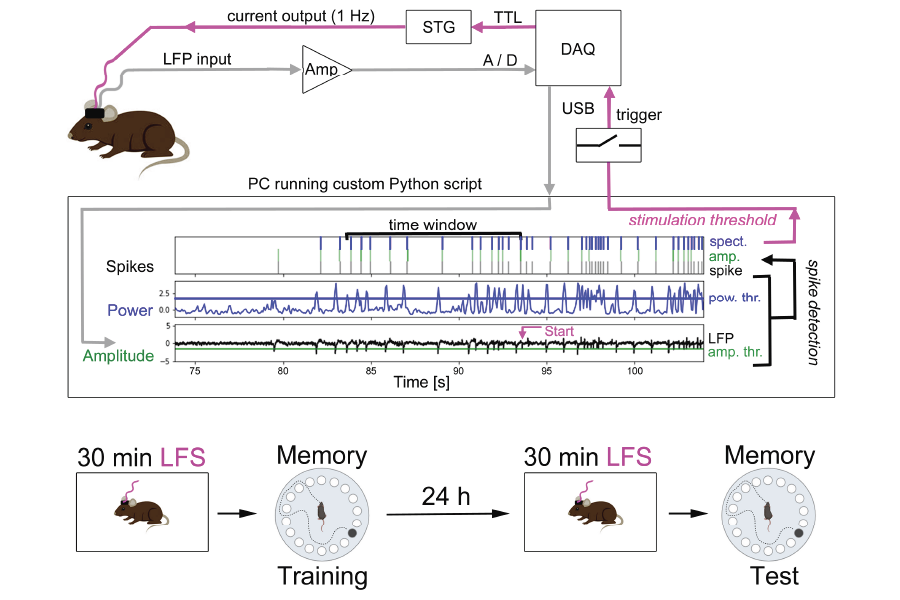Innovative approach for treatment-resistant epilepsy
New stimulation method shows success in controlling focal epileptic seizures in animal models

Low-frequency "on-demand" stimulation for seizure control in a chronically epileptic mouse. The system monitors hippocampal brain activity and responds to a specific epileptic pattern. The effects of stimulation on hippocampal function are examined in behavioral tests for learning and memory. Figure: AG Haas
Bernstein members involved: Katharina Heining, Ulrich Egert
Scientists at the Faculty of Medicine of the University of Freiburg have taken an important step towards a new type of treatment for people with mesial temporal lobe epilepsy (MTLE). MTLE is a common form of epilepsy in adults. The study, which appeared in the journal Brain on January 17, 2024, shows promising results in an animal model of a novel method called on-demand low-frequency stimulation (LFS). The brain stimulation was just as effective as previously used methods, but had significantly fewer side effects. The scientists now want to conduct further research into how the principle could be transferred to humans.
The MTLE form of epilepsy is often resistant to medication and frequently associated with pathological changes in the hippocampus, an important area of the brain. It therefore represents a particular challenge in the treatment of epilepsy. Implants can already be used to perform high-frequency stimulation of the brain area during a seizure in order to stop the seizure. However, permanent high-frequency stimulation has disadvantages: The systems often sound a false alarm, the stimulation only begins after the onset of the seizure and the effect is worse in pathologically altered tissue.
Fewer side effects thanks to targeted stimulation
The research group led by Prof. Dr. Carola Haas, Section Head of Experimental Epilepsy Research at the Department of Neurosurgery at the University Medical Center Freiburg, together with Prof. Dr. Ulrich Egert from the Department of Microsystems Engineering at the University of Freiburg, developed a method in which the low-frequency stimulation is only activated when certain activity patterns are detected in the brain. This reduces the stress caused by constant stimulation. The researchers used the method on a mouse model that mimics the key features of MTLE. “We were able to halve the stimulation time and still prevent seizures just as effectively. At the same time, the side effects were significantly lower.”
Positive effects on behavior and memory
A significant part of the study was dedicated to the investigation of behavioral and memory performance. Mice with epileptic seizures showed increased anxiety levels and impaired spatial memory performance. Interestingly, the scientists were able to show that the application of low-frequency stimulation before behavioral and test training could not only compensate for these negative effects, but even reduce deficits in long-term memory.
Prospects
These research results offer new insights into the treatment options for MTLE and could pave the way for less invasive and more efficient treatment methods. “Our results are a promising step towards an improved quality of life for patients with focal epilepsy,” says Haas.
Translated from German by Alexander Lammers/BCOS




